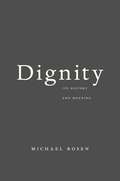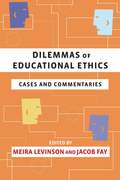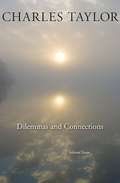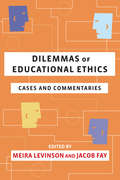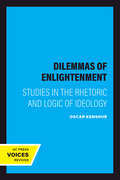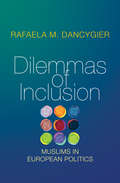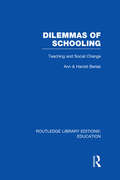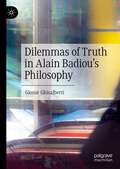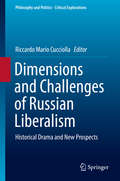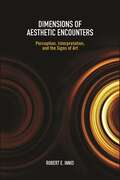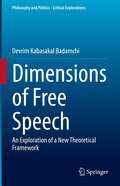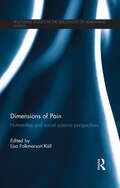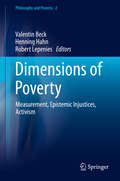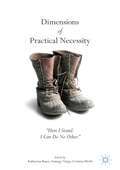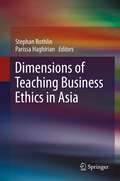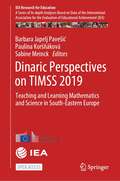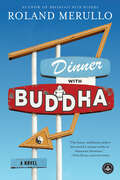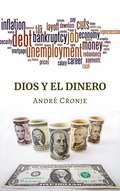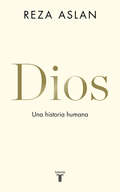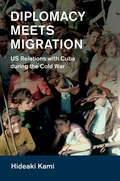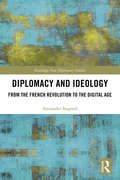- Table View
- List View
Dignity: Its History and Meaning
by Michael RosenDignity plays a central role in current thinking about law and human rights, but there is sharp disagreement about its meaning. Combining conceptual precision with a broad historical background, Michael Rosen puts these controversies in context and offers a novel, constructive proposal. “Penetrating and sprightly…Rosen rightly emphasizes the centrality of Catholicism in the modern history of human dignity. His command of the history is impressive…Rosen is a wonderful guide to the recent German constitutional thinking about human dignity…[Rosen] is in general an urbane and witty companion, achieving his aim of accessibly written philosophy.” —Samuel Moyn, The Nation “[An] elegant, interesting and lucid exploration of the concept of dignity...Drawing on classical, liberal and Catholic traditions, Rosen hopes to rehabilitate dignity to its rightful place near the centre of moral thought...Rosen's admirable book deserves wide attention from political theorists, jurisprudes and political philosophers.” —Simon Blackburn, Times Higher Education “Dignity deserves to be widely read, not only for its intrinsic interest, but also as a corrective to the habit of discussing such topics in abstraction from their social context. Whether or not one agrees with Rosen's arguments, there can be no doubt he has widened our horizons.” —Rae Langton, Times Literary Supplement
Dignity: Its History and Meaning
by Michael RosenDignity plays a central role in current thinking about law and human rights, but there is sharp disagreement about its meaning. Combining conceptual precision with a broad historical background, Michael Rosen puts these controversies in context and offers a novel, constructive proposal.“Penetrating and sprightly…Rosen rightly emphasizes the centrality of Catholicism in the modern history of human dignity. His command of the history is impressive…Rosen is a wonderful guide to the recent German constitutional thinking about human dignity…[Rosen] is in general an urbane and witty companion, achieving his aim of accessibly written philosophy.”—Samuel Moyn, The Nation“[An] elegant, interesting and lucid exploration of the concept of dignity...Drawing on classical, liberal and Catholic traditions, Rosen hopes to rehabilitate dignity to its rightful place near the centre of moral thought...Rosen's admirable book deserves wide attention from political theorists, jurisprudes and political philosophers.”—Simon Blackburn, Times Higher Education“Dignity deserves to be widely read, not only for its intrinsic interest, but also as a corrective to the habit of discussing such topics in abstraction from their social context. Whether or not one agrees with Rosen's arguments, there can be no doubt he has widened our horizons.”—Rae Langton, Times Literary Supplement
Dilemmas
by Gilbert RyleCommon sense tells me I can control my life to some extent; should I then, faced with a logical argument for fatalism, reject common sense? There seems to be no place in a physical theory of the universe for the sensory experiences of colours, taste and smells, yet I know I have these experiences. In this book, Gilbert Ryle explores the conflicts that arise in everyday life and shows that the either/or which such dilemmas seem to suggest is a false dilemma: one side of the dilemma does not deny what we know to be true on the other side. This classic book has been revived in a new series livery for twenty-first-century readers, featuring a specially commissioned preface written by Barry Stroud.
Dilemmas Of Educational Ethics: Cases And Commentaries
by Meira Levinson Jacob FayEducators and policy makers confront challenging questions of ethics, justice, and equity on a regular basis. Should teachers retain a struggling student if it means she will most certainly drop out? Should an assignment plan favor middle-class families if it means strengthening the school system for all? These everyday dilemmas are both utterly ordinary and immensely challenging, yet there are few opportunities and resources to help educators think through the ethical issues at stake. Drawing on research and methods developed in the Justice in Schools project at the Harvard Graduate School of Education, Dilemmas of Educational Ethics introduces a new interdisciplinary approach to achieving practical wisdom in education, one that honors the complexities inherent in educational decision making and encourages open discussion of the values and principles we should collectively be trying to realize in educational policy and practice. At the heart of the book are six richly described, realistic accounts of ethical dilemmas that have arisen in education in recent years, paired with responses written by noted philosophers, empirical researchers, policy makers, and practitioners, including Pedro Noguera, Howard Gardner, Mary Pattillo, Andres A. Alonso, Jamie Ahlberg, Toby N. Romer, and Michael J. Petrilli. The editors illustrate how readers can use and adapt these cases and commentaries in schools and other settings in order to reach a difficult decision, deepen their own understanding, or to build teams around shared values.
Dilemmas and Connections: Selected Essays
by Charles TaylorThere are, always, more things in heaven and earth than are dreamt of in one's philosophy - and in these essays the author turns to those things not fully imagined or avenues not wholly explored in his epochal. The author talks in detail about thinkers who are his allies and interlocutors, such as Iris Murdoch, Alasdair MacIntyre, and more.
Dilemmas of Educational Ethics: Cases and Commentaries
by Meira Levinson and Jacob FayEducators and policy makers confront challenging questions of ethics, justice, and equity on a regular basis. Should teachers retain a struggling student if it means she will most certainly drop out? Should an assignment plan favor middle-class families if it means strengthening the school system for all? These everyday dilemmas are both utterly ordinary and immensely challenging, yet there are few opportunities and resources to help educators think through the ethical issues at stake. Drawing on research and methods developed in the Justice in Schools project at the Harvard Graduate School of Education, Dilemmas of Educational Ethics introduces a new interdisciplinary approach to achieving practical wisdom in education, one that honors the complexities inherent in educational decision making and encourages open discussion of the values and principles we should collectively be trying to realize in educational policy and practice. At the heart of the book are six richly described, realistic accounts of ethical dilemmas that have arisen in education in recent years, paired with responses written by noted philosophers, empirical researchers, policy makers, and practitioners, including Pedro Noguera, Howard Gardner, Mary Pattillo, Andres A. Alonso, Jamie Ahlberg, Toby N. Romer, and Michael J. Petrilli. The editors illustrate how readers can use and adapt these cases and commentaries in schools and other settings in order to reach a difficult decision, deepen their own understanding, or to build teams around shared values.
Dilemmas of Enlightenment: Studies in the Rhetoric and Logic of Ideology (The New Historicism: Studies in Cultural Poetics #26)
by Oscar KenshurOscar Kenshur combines trenchant analyses of important early-modern texts with a powerful critique of postmodern theories of ideology. He thereby contributes both to our understanding of Enlightenment thought and to contemporary debates about cultural studies and critical theory.While striving to resolve "dilemmas" occasioned by conflicting intellectual and political commitments, seventeenth- and eighteenth-century writers often relied upon ideas originally used by their enemies to support very different claims. Thus, they engaged in what Kenshur calls "intellectual co-optation." In exploring the ways in which Dryden, Bayle, Voltaire, Johnson, and others used this technique, Kenshur presents a historical landscape distinctly different from the one constructed by much contemporary theory.
Dilemmas of Inclusion: Muslims in European Politics
by Rafaela M. DancygierAs Europe’s Muslim communities continue to grow, so does their impact on electoral politics and the potential for inclusion dilemmas. In vote-rich enclaves, Muslim views on religion, tradition, and gender roles can deviate sharply from those of the majority electorate, generating severe trade-offs for parties seeking to broaden their coalitions. Dilemmas of Inclusion explains when and why European political parties include Muslim candidates and voters, revealing that the ways in which parties recruit this new electorate can have lasting consequences.Drawing on original evidence from thousands of electoral contests in Austria, Belgium, Germany, and Great Britain, Rafaela Dancygier sheds new light on when minority recruitment will match up with existing party positions and uphold electoral alignments and when it will undermine party brands and shake up party systems. She demonstrates that when parties are seduced by the quick delivery of ethno-religious bloc votes, they undercut their ideological coherence, fail to establish programmatic linkages with Muslim voters, and miss their opportunity to build cross-ethnic, class-based coalitions. Dancygier highlights how the politics of minority inclusion can become a testing ground for parties, showing just how far their commitments to equality and diversity will take them when push comes to electoral shove.Providing a unified theoretical framework for understanding the causes and consequences of minority political incorporation, and especially as these pertain to European Muslim populations, Dilemmas of Inclusion advances our knowledge about how ethnic and religious diversity reshapes domestic politics in today’s democracies.
Dilemmas of Schooling: Teaching and Social Change (Routledge Library Editions: Education)
by Ann Berlak Harold BerlakThis study illuminates how the everyday activity of teachers raises profound economic, cultural, ethical, political and research issues, and provides a new and fruitful way of examining the practice of teaching. The first part of the book offers a detailed description of sensitively recorded school situations, arising from work carried out in a number of British primary schools. From the analysis of their research the authors constructed a theoretical perspective for looking at schooling in the form of sixteen ‘dilemmas’; the second half of the book is concerned with this perspective, and shows how the dilemmas constitute a language for looking at everyday schooling and relating it to more general political, social and cultural issues. The book thus spans the gap in educational thinking between work with a firm empirical base and specifically theoretical studies.
Dilemmas of Truth in Alain Badiou's Philosophy
by Giosuè GhisalbertiThis book on Alain Badiou’s philosophy begins with a central theme: the attempt to trace how Badiou has replaced the tradition of critical theory and negation with an affirmative support of his four generic procedures (art, science, love, and art) as inseparable from his revitalization of both the subject and the concept of truth. By defining four procedures as conditions of philosophy, Badiou makes the attempt to establish each as inter-related and systematically necessary to make a new proposal for thought. The fidelity to Badiou’s project for the 21st century, however, requires a fundamental examination: are his four truths complicated by an inescapable dilemma? And if so, can the four truths be retained, as a whole, or does the individual reader have to make a decision that will alter Badiou’s project and conclusions? By presenting the dilemmas of his thought, the scholarly reader will be in a position to then pursue the necessary study to come to their own conclusions and, by doing so, become sufficiently free to resist the many coercions of social and political life in liberal democracies today.
Dimensions and Challenges of Russian Liberalism: Historical Drama and New Prospects (Philosophy and Politics - Critical Explorations #8)
by Riccardo Mario CucciollaLiberalism in Russia is one of the most complex, multifaced and, indeed, controversial phenomena in the history of political thought. Values and practices traditionally associated with Western liberalism—such as individual freedom, property rights, or the rule of law—have often emerged ambiguously in the Russian historical experience through different dimensions and combinations. Economic and political liberalism have often appeared disjointed, and liberal projects have been shaped by local circumstances, evolved in response to secular challenges and developed within often rapidly-changing institutional and international settings. This third volume of the Reset DOC “Russia Workshop” collects a selection of the Dimensions and Challenges of Russian Liberalism conference proceedings, providing a broad set of insights into the Russian liberal experience through a dialogue between past and present, and intellectual and empirical contextualization, involving historians, jurists, political scientists and theorists. The first part focuses on the Imperial period, analyzing the political philosophy and peculiarities of pre-revolutionary Russian liberalism, its relations with the rule of law (Pravovoe Gosudarstvo), and its institutionalization within the Constitutional Democratic Party (Kadets). The second part focuses on Soviet times, when liberal undercurrents emerged under the surface of the official Marxist-Leninist ideology. After Stalin’s death, the “thaw intelligentsia” of Soviet dissidents and human rights defenders represented a new liberal dimension in late Soviet history, while the reforms of Gorbachev’s “New Thinking” became a substitute for liberalism in the final decade of the USSR. The third part focuses on the “time of troubles” under the Yeltsin presidency, and assesses the impact of liberal values and ethics, the bureaucratic difficulties in adapting to change, and the paradoxes of liberal reforms during the transition to post-Soviet Russia. Despite Russian liberals having begun to draw lessons from previous failures, their project was severely challenged by the rise of Vladimir Putin. Hence, the fourth part focuses on the 2000s, when the liberal alternative in Russian politics confronted the ascendance of Putin, surviving in parts of Russian culture and in the mindset of technocrats and “system liberals”. Today, however, the Russian liberal project faces the limits of reform cycles of public administration, suffers from a lack of federalist attitude in politics and is externally challenged from an illiberal world order. All this asks us to consider: what is the likelihood of a “reboot” of Russian liberalism?
Dimensions of Aesthetic Encounters: Perception, Interpretation, and the Signs of Art (SUNY series in American Philosophy and Cultural Thought)
by Robert E. InnisWe encounter in our lives things and situations that elicit from us special forms of attention. They affect and inform us in various ways, drawing us in and holding us in their grasp or turning us away. Works of art of all sorts, and nature in its myriad manifestations, exemplify these luring and repelling qualities and potencies. Dimensions of Aesthetic Encounters explores central perceptual, interpretative, and semiotic dimensions of these encounters, combining a wide range of examples and intellectual resources from pragmatist, hermeneutical, and semiotic frameworks. Practicing a kind of "method of rotation" Robert E. Innis breaks down barriers in aesthetic theory and shows their complementary powers. Recurring themes link each chapter, throwing a powerful light on aesthetic encounters by foregrounding such pivotal notions as play, fundedness and the role of memory, the defining quality of an artwork, energies of objects, potencies, rhythm, form, presentational abstraction, medium, symbolization, intuition, role of the body, and the non-argumentative nature of art.
Dimensions of Free Speech: An Exploration of a New Theoretical Framework (Philosophy and Politics - Critical Explorations #19)
by Devrim Kabasakal BadamchiThis book offers a new theoretical framework for free speech by critically analyzing the major justifications for free speech. Unlike most theories that justify free speech on single grounds, this book argues for a justification; namely the double grounded principled approach; that combines and revises the arguments of equal autonomy and democratic participation at the same time. It claims that a revised and critical blending of these two justifications can serve free speech to be grounded on strong principled arguments. The book has both a theoretical and practical focus: first, it discusses the conceptual circumstances of free speech and major theoretical justifications for free speech and then, it applies the developed theoretical framework to the cases of academic freedom, media freedom and hate speech separately. This volume will appeal to readers who are interested in general free speech theories as well as readers who look for an alternative view on specific topics such as academic freedom, media freedom and hate speech.
Dimensions of Pain: Humanities and Social Science Perspectives (Routledge Studies In The Sociology Of Health And Illness Ser.)
by Lisa Folkmarson KällPain research is still dominated by biomedical perspectives and the need to articulate pain in ways other than those offered by evidence based medical models is pressing. Examining closely subjective experiences of pain, this book explores the way in which pain is situated, communicated and formed in a larger cultural and social context. Dimensions of Pain explores the lived experience of pain, and questions of identity and pain, from a range of different disciplinary perspectives within the humanities and social sciences. Discussing the acuity and temporality of pain, its isolating impact, the embodied expression of pain, pain and sexuality, gender and ethnicity, it also includes a cluster of three chapters discusses the phenomenon and experience of labour pains. This volume revitalizes the study of pain, offering productive ways of carefully thinking through its different aspects and exploring the positive and enriching side of world-forming pain as well as its limiting aspects. It will be of interest to academics and students interested in pain from a range of backgrounds, including philosophy, sociology, nursing, midwifery, medicine and gender studies.
Dimensions of Poverty: Measurement, Epistemic Injustices, Activism (Philosophy and Poverty #2)
by Valentin Beck Henning Hahn Robert LepeniesThis anthology constitutes an important contribution to the interdisciplinary debate on poverty measurement and alleviation. Absolute and relative poverty—both within and across state boundaries—are standardly measured and evaluated in monetary terms. However, poverty researchers have highlighted the shortfalls of one-dimensional monetary metrics. A new consensus is emerging that effectively addressing poverty requires a nuanced understanding of poverty as a relational phenomenon involving deprivations in multiple dimensions, including health, standard of living, education and political participation. This volume advances the debate on poverty by providing a forum for philosophers and empirical researchers. It combines philosophically sound analysis and genuinely global research on poverty's social embeddedness. Next to an introduction to this interdisciplinary field—which links Practical Philosophy, Development Economics, Political Science, and Sociology—it contains articles by leading international experts and early career scholars. The contributors analyse the concept of poverty, detail its multiple dimensions, reveal epistemic injustices in poverty research, and reflect on the challenges of poverty-related social activism. The unifying theme connecting this volume's contributions is that poverty must be understood as a multidimensional and socially relational phenomenon, and that this insight can enhance our efforts to measure and alleviate poverty.
Dimensions of Practical Necessity
by Katharina Bauer Somogy Varga Corinna MiethThis collection of essays provides the first systematic investigation of practical necessity and offers novel perspectives on this intriguing phenomenon. While debates on necessity often take place in the realm of metaphysics, there is a form of necessity that is pertinent to practical philosophy. "Here I stand. I can do no other," a phrase habitually attributed to Martin Luther, is often interpreted as revealing underlying normative reasons that exhibit a special kind of necessitating force, experienced as an inescapable constraint by the agent. However, one of the features that make this phenomenon so fascinating is that this constraint is often deciphered as stemming from a form of necessitation that articulates the agent's autonomy or practical identity. Luther's saying serves as a leitmotif for an exploration of different claims and challenges related to practical necessity. As the complex philosophical investigations are based on familiar, everyday experiences the book is accessible to any academic readership.
Dimensions of Teaching Business Ethics in Asia
by Parissa Haghirian Stephan RothlinA growing number of higher education institutions in Asia are now integrating ethics courses in their curricula. But the challenge remains to develop courses that can effectively reach their objectives, and to create and use teaching materials appropriate to the particular profile of the students and executives in different regions and cultures. In this context, enhancing awareness for ethical dilemmas, proposing frameworks and models to help managers handle difficult choices and demanding decisions - while not being moralistic and imposing values - , and presenting alternative approaches through recent and relevant cases are the main objectives of this book. It examines teaching methods, learning tools and pedagogical methods effective in the teaching of ethics within the particular context of the rich diversity of Asian cultures, and discusses ethics courses curricula, aiming at developing the capacity to deal with a number of issues such as corruption, intellectual property protection, whistle blowing and consumer rights. The relevance and limits of Asian philosophical and spiritual traditions and how their underlying values can be a meaningful aspect in the teaching of ethics to managers and business leaders are explored, as are the benefits and limits of corporate codes of conduct and ways to enhance their effectiveness. A similar approach is taken to the introduction of "oaths" and "ethics pledges" among business students, which has been promoted in some business schools.
Dinaric Perspectives on TIMSS 2019: Teaching and Learning Mathematics and Science in South-Eastern Europe (IEA Research for Education #13)
by Barbara Japelj Pavešić Paulína Koršňáková Sabine MeinckThis open access book brings together national experts from across the Dinaric region to rigorously review IEA’s Trends in International Mathematics and Science Study (TIMSS) 2019 grade four data to develop a multidimensional and culturally sensitive perspective on their TIMSS 2019 primary-level results. The Dinaric region, named after the Dinaric Alps, is located in South-eastern Europe, and stretches through Croatia, Bosnia and Herzegovina, Serbia, Montenegro, Kosovo[1], Albania, and North Macedonia. IEA’s TIMSS has been an invaluable resource for monitoring international trends in mathematics and science achievement at grades four and eight since 1995. The TIMSS 2019 administration of the test to grade four students, provided a unique opportunity for analysis within shared regional settings and enabled the construction of this first report based on international study results from the region, prepared by the National Research Coordinators in collaboration with IEA. [1] This designation is without prejudice to positions on status and is in line with UNSCR 1244/1999 and the ICJ Opinion on the Kosovo declaration of independence.
Dinner with Buddha: A Novel
by Roland Merullo“We, like Otto, find our cynicism worn away by Rinpoche’s gentle instruction in the simple but terribly difficult art of letting go, living each moment to the fullest, seeing the sacred in the everyday . . . This brave, meditative author has carved a unique niche in American literature.” —Kirkus Reviews starred review If life is a journey--with detours, paths from which to choose, and myriad roadblocks to overcome--then Otto Ringling is most certainly on the journey of a lifetime. The first fifty or so years of his journey were pretty good. He felt that he had it all, until one day he didn’t. Looking for answers, he calls on his brother-in-law, Volya Rinpoche, a wise man and spiritual leader. A man who accepts the world as it comes to him; a man without pride or vanity. Someone who, as it turns out, is experiencing his own time of doubt. So, in hopes of finding answers to life’s mysteries, the two embark on a journey through America, a road trip that becomes a lesson in love and gratitude. “Merullo offers keen insight into and intelligent assessments of modern American life, but it is his compassionate portrait of a grieving Otto in search of inner tranquility that is most affecting.” —Booklist “Otto is such a full human, which is why we can empathize with his questions and immerse ourselves in his experiences. In the end, we are all humanized by the spiritual journey of Dinner with Buddha.” —Spirituality and Practice “Merullo masterfully depicts the struggles of practicing mindfulness moment by moment . . . [The] novel is full of nuanced, thoughtful prose and is an immensely satisfying conclusion to the series.” —Publishers Weekly
Diogenes Laertius
by Tiziano DorandiThis edition presents a radically improved text of Diogenes Laertius Lives of Eminent Philosophers. The text is accompanied by a three level apparatus. A lengthy introduction list all the manuscripts of Diogenes Lives and discusses its transmission in Late Antiquity and Medieval and Renaissance Periods. There is also a index of personal names, a bibliography and some notes which cover several features of the text and its interpretation. Tiziano Dorandi has used the Nachlass of Peter Von der Muhll, for the first time in its entirety, to verify and consolidate material that he had previously gathered. This is by far the most detailed and elaborate edition which Diogenes Lives a work unique in his kind, and which has had a profound influence on European literature and philosophy has ever received
Dios es Energía Oscura
by Walter ParksDios es Energía Oscura es una deslumbrante narración del mundo, desde el inicio de los tiempos hasta asomarnos a la eternidad. Muy lejos de tratarse de una obra de fantasía es un excelente trabajo que de manera sutil propicia el entendimiento de descubrimientos científicos hasta ahora ajenos al común de las personas. La Teoría de la Relatividad, la Física Cuántica, la Teoría-M, etc. expuestas con la singularidad Maestra de Walter Park nos permite entender de hecho la Palabra de La Biblia cuando dice: "En el principio Dios creó los cielos y la tierra." Génesis 1.
Dios y el dinero: Bienaventurados los pobres
by André Cronje¿Alguna vez has pensado en lo que dice Dios acerca del dinero y la riqueza? Lee historias financieras reales y encontrarás aplicaciones prácticas a las leyes espirituales que Jesús enseñó sobre cómo prosperar y acumular tesoros para ti mismo en el cielo.
Dios: Una historia humana
by Reza AslanCómo el hombre creó a Dios a su propia imagen: una visión original, abierta y contemporánea de la religión. «Fascinante. Tratándose de la biografía introductoria de la que a todas luces puede considerarse la figura más influyente de todos los tiempos, resulta sin duda interesante.»Catherine Nixey, The Sunday Times Con la habilidad a la que nos tiene acostumbrados, Reza Aslan nos narra la historia de la religión para mostrarnos cómo esta ha estado marcada por nuestra insistencia en darle a Dios rasgos y emociones humanos. Según Aslan, esta tendencia a crear una versión divina de nosotros mismos es innata: está programada en nuestro cerebro, de ahí que sea una característica central de casi todas las tradiciones religiosas. Y esta proyección tiene consecuencias, pues le otorgamos a Dios no solo todo lo bueno de la naturaleza humana -nuestra compasión, nuestro afán de justicia - , sino también todo lo malo: nuestra avaricia, nuestro fanatismo, nuestra inclinación a la violencia. Todas estas cualidades informan nuestras religiones, culturas y gobiernos. Este libro es mucho más que una historia sobre la comprensión de Dios: es un intento de llegar a la raíz de este impulso humanizador para desarrollar una espiritualidad más universal. Creamos en un Dios, en muchos o en ninguno, este libro valiente, ambicioso y provocador transforma el modo en que pensamos en la religión, así como nuestra relación con la vida, la muerte, lo espiritual y, en definitiva, la esencia misma de la existencia humana. La crítica ha dicho...«Oportuno, fascinante, esclarecedor y necesario.»Huffington Post «Irresistible. Con la gracia y la curiosidad que caracterizan a Reza Aslan, Dios nos ofrece una salida a estos tiempos difíciles, mientras nos pide que consideremos una visión más amplia de lo divino en la vida contemporánea.»TheSeattle Times «Una exploración fascinante de la interacción de nuestra humanidad y Dios.»Pittsburgh Post-Gazette «El delgado pero ambicioso libro de Aslan es la historia de cómo los humanos han creado a Dios con una G mayúscula, y es completamente alucinante.»Los Angeles Review of Books «Aslan es un narrador nato, y hay mucho que disfrutar en esta inteligente investigación.»San Francisco Chronicle «Extraordinario. Claro, conciso y ameno.»The Spectator
Diplomacy Meets Migration: US Relations with Cuba during the Cold War (Cambridge Studies in US Foreign Relations)
by Hideaki KamiDiplomacy Meets Migration examines diplomacy, migration, and the history of US relations with Cuba during the Cold War. Hideaki Kami draws on declassified US and Cuban diplomatic sources, as well as Miami-Cuban lobby records, to challenge traditional interpretations that mainly focus on the two national capitals, Washington and Havana. By incorporating Miami into the story of foreign affairs, Kami assesses the intersection between migration and diplomacy, and considers how migration emerged as a critical issue that shaped the dynamism of US relations with Cuba. Kami demonstrates that the US government reformulated its Cuban policy in response to Fidel Castro's institutionalization of power, while simultaneously trying to build a new relationship with the Miami Cuban community, a new, politically mobilized constituency within US society. He shows how both migration control and migrant politics became important components of US foreign policy, which in turn influenced Cuban policy toward the United States.
Diplomacy and Ideology: From the French Revolution to the Digital Age (Routledge New Diplomacy Studies)
by Alexander StagnellThis innovative new book argues that diplomacy, which emerged out of the French Revolution, has become one of the central Ideological State Apparatuses of the modern democratic nation-state. The book is divided into four thematic parts. The first presents the central concepts and theoretical perspectives derived from the work of Slavoj Žižek, focusing on his understanding of politics, ideology, and the core of the conceptual apparatus of Lacanian psychoanalysis. There then follow three parts treating diplomacy as archi-politics, ultra-politics, and post-politics, respectively highlighting three eras of the modern history of diplomacy from the French Revolution until today. The first part takes on the question of the creation of the term ‘diplomacy’, which took place during the time of the French Revolution. The second part begins with the effects on diplomacy arising from the horrors of the two World Wars. Finally, the third part covers another major shift in Western diplomacy during the last century, the fall of the Soviet Union, and how this transformation shows itself in the field of Diplomacy Studies. The book argues that diplomacy’s primary task is not to be understood as negotiating peace between warring parties, but rather to reproduce the myth of the state’s unity by repressing its fundamental inconsistencies. This book will be of much interest to students of diplomacy studies, political theory, philosophy, and International Relations.
